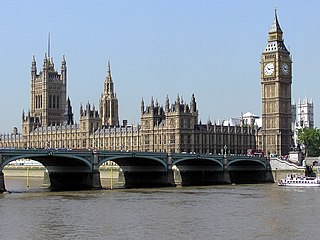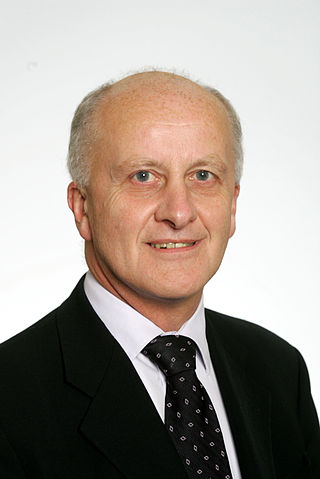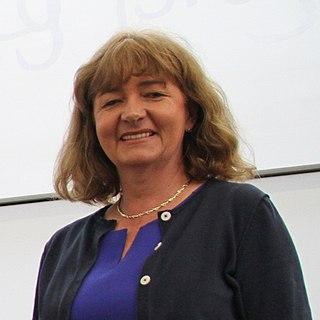A national academy is an organizational body, usually operating with state financial support and approval, that co-ordinates scholarly research activities and standards for academic disciplines, and serve as public policy advisors, research institutes, think tanks, and public administration consultants for governments or on issues of public importance, most frequently in the sciences but also in the humanities. Typically the country's learned societies in individual disciplines will liaise with or be coordinated by the national academy. National academies play an important organisational role in academic exchanges and collaborations between countries.

Sir Colin Blakemore,, Hon was a British neurobiologist, specialising in vision and the development of the brain. He was Yeung Kin Man Professor of Neuroscience and senior fellow of the Hong Kong Institute for Advanced Study at City University of Hong Kong. He was a distinguished senior fellow in the Institute of Philosophy, School of Advanced Study, University of London and Emeritus Professor of Neuroscience at the University of Oxford and a past Chief Executive of the British Medical Research Council (MRC). He was best known to the public as a communicator of science but also as the target of a long-running animal rights campaign. According to The Observer, he was both "one of the most powerful scientists in the UK" and "a hate figure for the animal rights movement".
Sir William Duncan Paterson Stewart was President of the Royal Society of Edinburgh from 1999–2002 and Chairman of the Microbiological Research Authority.

The Parliamentary Office of Science and Technology (POST) is the Parliament of the United Kingdom's in-house source of independent, balanced and accessible analysis of public policy issues related to science and technology. POST serves both Houses of Parliament.
Sir Gareth Gwyn Roberts was a Welsh physicist specialising in semiconductors and molecular electronics, who was influential in British science policy through his chairmanship of several academic bodies and his two reports on the future supply of scientists and how university research should be assessed. He was knighted in 1997 for his services to higher education.

Research Councils UK, sometimes known as RCUK, was a non-departmental public body that coordinated science policy in the United Kingdom from 2002 to 2018. It was an umbrella organisation that coordinated the seven separate research councils that were responsible for funding and coordinating academic research for the arts, humanities, science and engineering. In 2018 Research Councils transitioned into UK Research and Innovation (UKRI).

Sir John Rex BeddingtonHonFREng is a British population biologist and Senior Adviser at the Oxford Martin School, and was previously Professor of Applied Population Biology at Imperial College London, and the UK Government Chief Scientific Adviser from 2008 until 2013.

Robert James Mair, Baron Mair, is a geotechnical engineer and Emeritus Sir Kirby Laing Professor of Civil Engineering and director of research at the University of Cambridge. He is Head of the Cambridge Centre for Smart Infrastructure and Construction (CSIC). He was Master of Jesus College, Cambridge, from 2001 to 2011 and a fellow of St John's College, Cambridge, from 1998 to 2001. In 2014 he was elected a vice president of the Institution of Civil Engineers and on 1 November 2017 became the Institution's president for 2017–18, its 200th anniversary year. He was appointed an independent crossbencher in the House of Lords in 2015 and is currently a member of its Select Committee on Science and Technology.
Omar bin Abdul RahmanP.S.M., J.M.N., J.S.M. is a Malaysian academician and corporate figure. Omar is currently the President and Chief Executive Officer of the MUST Ehsan Foundation, a non profit foundation that currently manages and administers the Malaysia University of Science and Technology (MUST).

The Government Office for Science is a science advisory office in the UK Government. The office advises the Government on policy and decision-making based on science and long-term thinking. It has been led by Professor Dame Angela McLean, the Government Chief Scientific Adviser, since 23 February 2023.
The Society for Underwater Technology (SUT) is an international learned society for marine science and technology with headquarters in London, England that was founded in 1966. There are branches in Aberdeen (Scotland), Houston (USA), Rio de Janeiro (Brazil), Newcastle (England), Perth (Australia), London (England), Melbourne (Australia), Kuala Lumpur (Malaysia), Singapore, Norway (Bergen), China (Beijing) West Africa (Nigeria), the Middle East (UAE) and new branches in early stages of development in St John's Newfoundland & the Eastern Mediterranean to be based in Cyprus. Membership is open to individuals, companies, and institutions with a genuine interest in the broad field of underwater technology. SUT is registered as a charity in the UK, other branches are constituted as charities or 'not-for-profits' as per local legislation.

Dame Lesley Anne Glover is a Scottish biologist and academic. She was Professor of molecular biology and cell biology at the University of Aberdeen before being named Vice Principal for External Affairs and Dean for Europe. She served as Chief Scientific Adviser to the President of the European Commission from 2012 to 2014. In 2018 she joined the Principal's senior advisory team at the University of Strathclyde.

Sir Ian Lamont Boyd, is a Scottish zoologist, environmental and polar scientist, former Chief Scientific Adviser at the Department for Environment, Food and Rural Affairs (DEFRA) and is a professor of biology at the University of St Andrews. He is Chair of the UK Research Integrity Office and President of the Royal Society of Biology.

Jason Meredith Reese (24 June 1967 – 8 March 2019 was a British engineering scientist, and Regius Professor of Engineering at the University of Edinburgh.

Prof John Neil Loughhead CB OBE FREng FIMechE FIET is a British businessman and Chief Scientific Adviser to Department for Business, Energy and Industrial Strategy (BEIS). He is also a Fellow of the Royal Academy of Engineering, Chair of the Energy research partnership and was formerly the Executive Director of the UK Energy Research Centre. He was appointed an OBE for services to Technology in 2011. In 2014, he was voted as one of the Top 500 Most Influential People in Britain by Debrett's and The Sunday Times.
The Department of Scientific and Industrial Research was a department of the British Government responsible for the organisation, development, and encouragement of scientific and industrial research. At the outbreak of the First World War "Britain found ... it was dangerously dependent on enemy industries". At the request of the Board of Trade, the Board of Education prepared a White Paper under the chairmanship of Sir William McCormick. The DSIR was set up to fill the roles that the White Paper specified: "to finance worthy research proposals, to award research fellowships and studentships [in universities], and to encourage the development of research associations in private industry and research facilities in university science departments. [It] rapidly assumed a key role in coordinating government aid to university research. It maintained these roles until 1965. The annual budget during its first year, 1915, was £1,000,000.

Sheila Rowan is a Scottish physicist and academic, who is Professor of Physics and Astronomy at the University of Glasgow in Scotland, and director of its Institute for Gravitational Research since 2009. She is known for her work in advancing the detection of gravitation waves. In 2016, Rowan was appointed the (part-time) Chief Scientific Advisor to the Scottish Government.
Louise Heathwaite is a British environmental scientist. She is Distinguished Professor in the Lancaster Environment Centre at Lancaster University and Pro-Vice-Chancellor of Research and Enterprise. She is a hydrochemist working on diffuse environmental pollution, especially the pathways of nitrogen and phosphorus loss from agricultural land to water.
The Scientific Advisory Group for Emergencies (SAGE) is a British Government body that advises central government in emergencies. It is usually chaired by the United Kingdom's Chief Scientific Adviser. Specialists from academia and industry, along with experts from within government, make up the participation, which will vary depending on the emergency. SAGE gained public prominence for its role in the 2020 COVID-19 pandemic in the United Kingdom.

Julie Lydia Fitzpatrick is a Scottish scientist and academic. She is the CEO of Moredun Research Institute and Scotland's part-time Chief Scientific Advisor. She attended Scientific Advisory Group for Emergencies meetings in that role.











